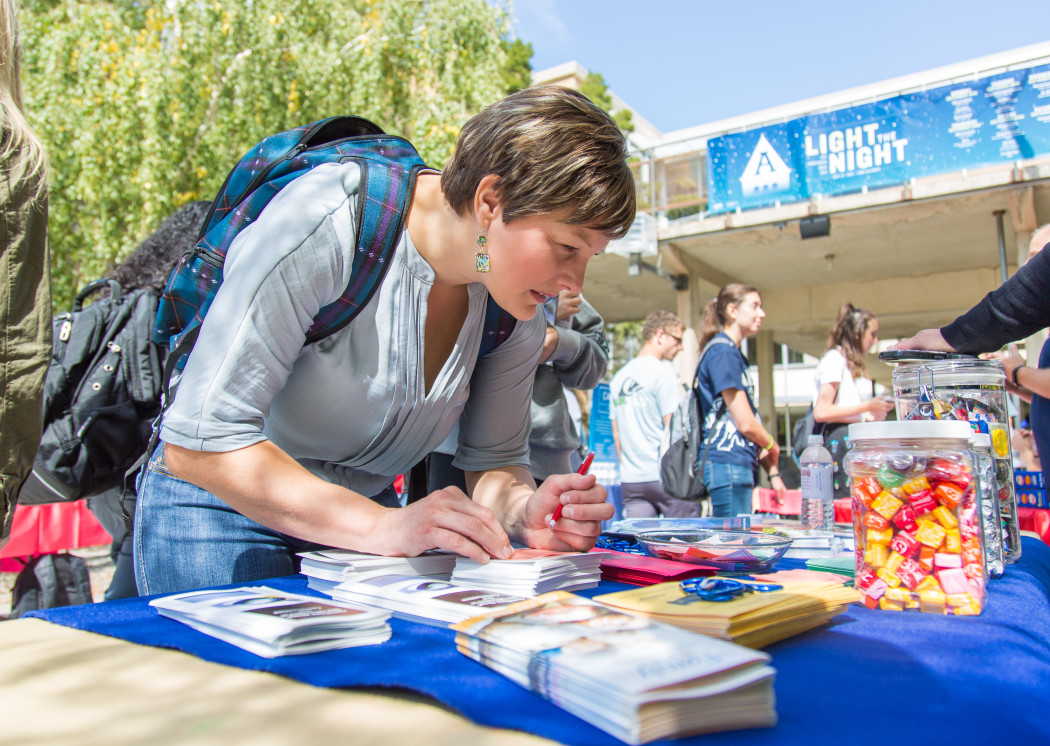Annual ‘Red Zone’ event aims to unify community around sexual violence prevention
It’s the usual scenes. Students slug through the sea of red tables, eyes glued to their cell phones and ear buds tucked tightly in their ears as they make every conscious effort to avoid being handed an informational pamphlet or listening to another spiel about sexual violence. The same spell they’ve heard “thousands of times.”
Completely disinterested, one student says “no thanks” when asked if they’d like to answer questions about consent in order to play “toss the bean bag” or fill out a questionnaire for a chance to win a raffle contest.
When a Health and Wellness Center intern offered them a pamphlet about alcohol and sexual activity, the student pushed it back into the hands of the intern who offered it.
This particular student doesn’t think the annual “Red Zone” event, meant to inform students about sexual violence and healthy sexuality, is a bad thing, it’s just something he’s already heard.
“It’s just nothing I’m interested in learning about,” the student said. Plus, he said, the information has been pushed “down my throat” plenty of times before in other settings.
Mainly, the student said, sexual violence isn’t something they think about, because they don’t necessarily have to.
“I guess I’m not super interested because it’s not something I have to worry about,” they said. “It’s not something my close friends are in the mix of.”
This particular student doesn’t know any victims of sexual violence. Statistically, one in four women and one in 16 men on college campuses are victims, but this student said those statistics don’t apply to their circle of friends. “My close friends have never been perpetrators or victims of it.”
Felicia Gallegos, outreach coordinator for the Utah State University Sexual Assault and Anti-Violence Information office, said this student’s claims “make me sad,” because preventing sexual violence “is on all of us.”
“Statistically, we all know a survivor,” she said, “it’s on all of us to start that conversation.”
Others at the event felt comments such as this student’s were “very privileged.”
Jeremy Twitchell, a nonbinary person, said “looking different and using different pronouns” makes them feel more worried about being a victim of sexual violence. Twitchell is a two-time survivor and worries when they’ll be attacked again.
“If you don’t act as a community, if you don’t take care of each other, then what’s the point,” they said. “Things don’t change until the community comes together and decides its an issue.”
Andrew Damas, another event attendee, said groups at lower risk for being victims of sexual violence have a greater responsibility for ending it.
“Just because you’re a man and say you don’t sexually assault doesn’t mean you can’t learn,” he said. “We can all be better.” The event is held once a year, always within the first week of school, as this is the beginning of the time period known as “red zone,” when students are most likely to be sexually assaulted.
“Individuals being away from home for the first time, experimenting with drugs and alcohol, there are all kinds of factors,” Gallegos said. “We host this event to raise awareness about the red zone period and also to have conversations with students about consent, about the resources that are available to them, how to respond to survivors.”
While some attendees were disinterested or even annoyed, others felt it was “completely necessary.”
“It happens at every single college campus,” said Jillian Gary, volunteering at a booth for Citizens Against Physical and Sexual Abuse, “we all need this.”
– alisonberg28@gmail.com
@alison__berg

